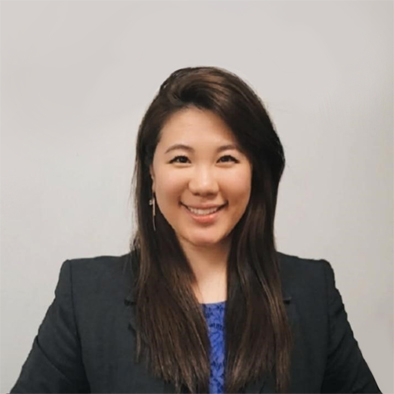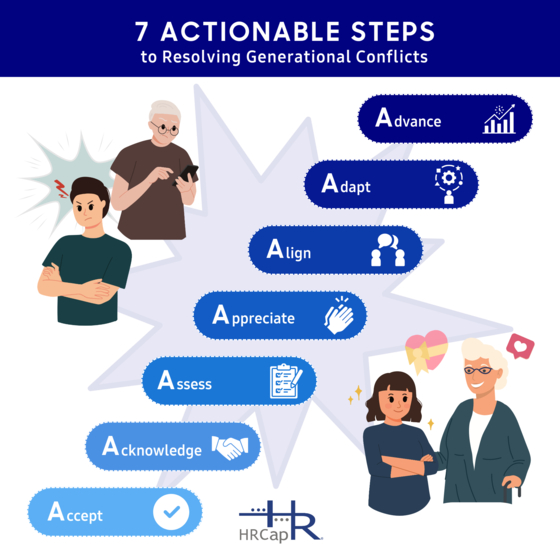[전문가 칼럼] 세대 갈등 7단계로 풀기
HRCap 7A Conflict Resolution Model 적용
세대차이, 세대가 다른 개인의 차이

스텔라 김 HRCap, Inc. 상무(Chief Marketing Officer)
세대갈등을 사회적 지위와 관계에 따른 힘과 정책으로 풀어나간다면 이는 진정한 해결책이 아니다. 보이는 부분만 해결한다면 이는 미봉책이며, 오히려 더 심각해질 수 있다. 갈등은 피할수록 더 독이 되기 때문이다. 이를 지혜롭게 해결할 수는 없을까? 세대, 나이로 인해 발생하는 갈등에너지를 긍정적인 방향으로 전환하고 현명하게 극복할 수 있는 방법이 있지 않을까?
HRCap '7A Conflict Resolution Model' 을 적용, 7가지 단계별 행동을 따르면 수많은 갈등 상황을 잘 극복할 수 있다.
1. Accept – 많은 사람들이 놓치고 있는 부분으로, 그 갈등을 해소하고 극복하겠다는 진정한 태도다. 열린 마음으로 상황을 받아들이고, 책임감을 갖고 상대방과 갈등관계를 해소하길 원하는 진정성이 있어야 한다.
2. Acknowledge – 소통을 통해 상대를 이해하고 갈등을 인지해야 한다. 피하지 말고 정확하게 현재의 상황과 현실을 인식할 수 있도록 귀를 기울여야 한다.
3. Assess – 갈등상황의 원인과 문제점을 파악하고 분석해야 한다. '무엇'이 문제인지 보다는 '왜' 갈등이 생겼는지에 초점을 두고, "그럴수도 있겠구나"하며 상대방의 관점에서 바라보는 것이 필요하다.
4. Appreciate – 공감대를 형성해 서로가 다름을 존중해야한다. 본인의 부족한 점을 인정하고 상대방의 장점에 집중해야 한다. 갈등의 원인을 파악해 또다른 갈등, 그리고 수면 아래에 있던 문제들로 발생 가능한 상황도 미리 방지하는 계기가 됐음에 감사해야 한다.
5. Align – 본인과 상대방의 요구사항을 충족하고 수용할 수 있는 범위 내에서 최대한 맞출 수 있도록 함께 노력해야한다. 서로가 만족할 수 있는 솔루션을 만들기 위해 끊임없이 소통하며 간극을 줄여야 한다.
6. Adapt – 꾸준한 노력을 통해 도출한 솔루션에 적응하도록 해야한다. 서로 조금씩 손해보면서 배려하고 맞춰나가면 결국 서로에게 득이 된다.
7. Advance – 변화를 통해 발전해야 한다. 상황과 관계, 그리고 본인 자신이 변하고 발전해야 그 갈등을 충분히 극복했다고 볼 수 있다.
시대의 변화, 세대간 경험 및 가치관 차이, 엄청난 속도의 기술 발전으로 세대간의 갈등은 불가피하다. 중요한 것은 이 세대간의 갈등을 어떻게 풀어나갈 것인가다. 고정관념과 편견을 갖고 구별짓기보다는, 세대차이가 아닌 '세대가 다른 개인의 차이'로 인식하며 다양한 배경, 경력, 사고방식을 존중해야 한다. 갈등을 성장의 기회로 삼아 공존하고 함께 발전하는 길을 걸어야 한다.
결국 우리는 소통해야 한다. 불만을 지혜롭게 이야기하고, 현명하게 극복해야 갈등을 건설적으로 해결할 수 있다. 그래야 성공은 물론, 삶의 질이 높아진다. 생각이 깊어지고, 마음의 여유가 생기고, 내면이 단단해져서 기업이 반드시 뽑아야만 하는 인재, 같이 일해보고 싶은 동료, 모시고 싶은 리더, 선한 영향력을 가진 지인, 언제든 함께하면 행복한 사람이 될 수 있을 것이다.
스텔라 김
HRCap, Inc. 상무(Chief Marketing Officer)
[Expert Column] 7 Actionable Steps to Resolving Generational Conflicts
Generational conflicts have progressively become a serious concern in the United States. They exist in personal relationships, households, organizations, and our greater society. Generational conflicts have led to resignations at workplaces and complete communication barriers among family members. Even the term “age discrimination” has emerged.
Generational conflicts cannot be resolved through policy enforcement or power coercion based on statuses and hierarchies. This would only be superficially addressing and clouding the issue, thereby further aggravating the conflict at hand. Conflicts become even more toxic if avoided. That said, how can we resolve these conflicts constructively and wisely? How do we transform the negative energy caused by generational conflicts into a positive source of growth?
We can apply the ‘HRCap 7A Conflict Resolution Model,’ a seven-step actionable guideline, to effectively approach and resolve the varying conflicts in our lives.
1. Accept - Many oversee this critical step. We must first have the genuine desire to resolve and overcome the conflict. Accept the situation with an open mind, be sincere in our approach, and take full accountability to resolve the conflict.
2. Acknowledge - Instead of dismissing or avoiding the conflict, we must acknowledge the conflict by leaning in. Communicate openly and listen carefully to truly recognize the situation and understand the reality.
3. Assess - We must identify and assess the cause of the problem. Focus on understanding ‘why’ the conflict happened rather than looking at ‘what’ the problem is. Take a step back to see it from the other’s perspective and be able to think, “I see your point,” “That’s fair enough,” “I can understand.”
4. Appreciate - We must learn to sympathize and appreciate our differences. Recognize our own shortcomings, and celebrate the other’s strengths. Be grateful that we are able to address other underlying issues and prevent future conflicts by identifying the root of the conflict.
5. Align - We must have alignment. Continuously communicate to reduce the gap. Build consensus by deliberating on the requirements, and accommodate to collectively reach a reasonable solution.
6. Adapt - We must consistently make an effort to adjust and adapt to reach the derived solution. It’s okay for each to take a slight loss for the greater benefit of all.
7. Advance - We must advance through change. The conflict can only be considered truly resolved should there be effective change and proper development in the situation, the relationship, and our own selves.

Source: HRCap, 7A Conflict Resolution Model
As such, we must learn to communicate. We need to productively express our dissatisfaction and constructively overcome conflicts. This will not only allow us to be more successful, but also live more meaningfully with deeper perspectives, a heart full of grace, and stronger self-worth. We must strive to become the talent companies compete to hire, the colleague peers ask to collaborate with, the respected leader employees wish to work under, the acquaintance that allows positive influence, and the person that always radiates gratitude and happiness.
Stella H. Kim, SPHR | HRCap - Chief Marketing Officer & Global VP










with the Korea JoongAng Daily
To write comments, please log in to one of the accounts.
Standards Board Policy (0/250자)